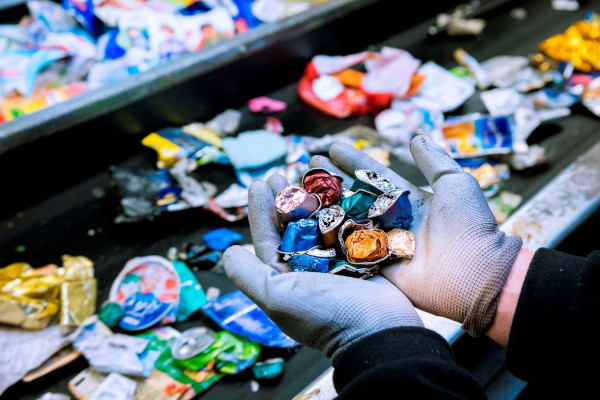Where do coffee capsules belong? How do you dispose of them correctly and, above all, in an environmentally friendly manner? This question is not quite so easy to answer. More and more manufacturers are taking responsibility and ensuring that their coffee capsules can be recycled after use. They have therefore applied to the relevant German waste authorities for a special permit under which the capsules in Germany take the same disposal route as packaging. For example, they can be collected in the German yellow bag or yellow bin, disposed of and then recycled.
Which coffee capsules belong in the German yellow bag or yellow bin?
Coffee capsules belong to the so-called beverage system capsules. According to the German Packaging Act, beverage system capsules that have not been emptied of residues do not count as sales packaging and, in purely legal terms, are to be regarded as residual waste, even though they contain valuable raw materials that are largely lost through waste incineration.
It is therefore all the more crucial that the manufacturers in Germany themselves take responsibility and ensure that the capsules can enter the German dual system. They pay for their capsules to be disposed of in the yellow bin or yellow bag after use, in which the lightweight packaging is collected in Germany. Unfortunately, this is often not immediately apparent from the capsules. There is often a note on the packaging or the manufacturer provides information about this on its website. If there is no information about disposal, it may help to contact the respective manufacturer.
Here are some exemplary links with information on the disposal of capsules from different manufacturers:
capsa (dallmayr.de)
(German language only)
(German language only)

NESCAFÉ®
DOLCE GUSTO®
(German language only)

(German language only)
Nespresso
(German language only)

(German language only)

Tchibo Cafissimo
(German language only)


More and more manufacturers want their coffee capsules to be recycled after use and in Germany therefore have them collected by dual systems. Recycling used coffee capsules is also important to German consumers. They should already pay attention to how to properly dispose of the coffee capsules when shopping.
GreenDot Group’s position on coffee system single serve units in the proposal for Packaging and Packaging Waste Regulation (PPWR)
The EU is pursuing ambitious plans to bring the sustainability of packaging to a top level within a specified period of time. This is demonstrated by the draft European Packaging and Packaging Waste Regulation (PPWR) presented at the end of November 2022. GreenDot Group welcomes and supports the European Commission's ambition to reduce the resource consumption of packaging, improve the recyclability of packaging and thus reduce the environmental impact of packaging by updating the current legislation. In our position paper you will find some comments concerning the regulations on coffee capsules in the draft.
Nescafé Dolce Gusto and Der Grüne Punkt have been working together for many years to recycle used capsules and thus keep the valuable plastic in the cycle and continue to use it. To do this, consumers in Germany can simply dispose of the used capsules in the yellow bin or yellow bag. The video shows how collection, sorting and recycling work.
Are coffee capsules made of biodegradable plastic an ecological alternative?
Some manufacturers offer coffee capsules made of biodegradable plastic. There are various standards that form the basis for this designation. The most important and best known is EN 13432, according to which the material must decompose by at least 90 percent within a certain time under certain conditions. However, these conditions are not guaranteed in most German industrial composting plants. Almost all municipalities in Germany therefore prohibit such packaging from being disposed of in organic waste.
Recycling via the German yellow bag or yellow bin is also not possible, as capsules made of biodegradable plastic are not recognized by the machines in the German sorting plants. Coffee capsules made of biodegradable plastic in Germany belong in the residual waste.
